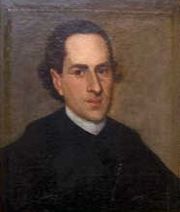
Nicola Spedalieri
Encyclopedia

Life
He studied in the seminary of MonrealeMonreale
Monreale is a town and comune in the province of Palermo, in Sicily, Italy, on the slope of Monte Caputo, overlooking the very fertile valley called "La Conca d'oro" , famed for its orange, olive and almond trees, the produce of which is exported in large quantities...
, then the most flourishing in Sicily, was ordained priest, and appointed professor of philosophy and mathematics, and later of theology. At the same time he cultivated the arts of poetry, music, and painting. Disgusted at the opposition stirred up by certain theological theses, which were branded as heretical at Palermo
Palermo
Palermo is a city in Southern Italy, the capital of both the autonomous region of Sicily and the Province of Palermo. The city is noted for its history, culture, architecture and gastronomy, playing an important role throughout much of its existence; it is over 2,700 years old...
but approved at Rome, he withdrew from Monreale to Rome (1773 or 1774), where for ten years he led a life of penury but of fruitful study and labour. However, he always retained his affection for the seminary of Monreale.
In 1784 he obtained from Pope Pius VI
Pope Pius VI
Pope Pius VI , born Count Giovanni Angelo Braschi, was Pope from 1775 to 1799.-Early years:Braschi was born in Cesena...
a benefice in the Vatican Basilica, and then ceased the efforts he had made for years to obtain a chair in the Universities of Pisa, Pavia, and Turin.
Works
His first published work was "Analisi dell' Esame critico di Fréret" ("Examen critique des apologies de la religion chrétienne", a work wrongly attributed to Fréret, really written by Naigeon), Rome, 1778. In 1779 he published "Ragionamento sopra l'arte di governare" and "Ragionamento sull' influenza della religione cristiana sulla società civile". In 1784 he issued, also at Rome, his "Confutazione di Gibbon" in which he combats the thesis of Edward GibbonEdward Gibbon
Edward Gibbon was an English historian and Member of Parliament...
, who blamed Christianity for the downfall of the Roman Empire. In it, as in the Apology against Fréret, he argues the benefits conferred by the Christian religion on the social and political order, inasmuch as Christianity is the most powerful bulwark against despotism
Despotism
Despotism is a form of government in which a single entity rules with absolute power. That entity may be an individual, as in an autocracy, or it may be a group, as in an oligarchy...
.
In 1791 appeared his principal work "I diritti dell' uomo", also at Rome; this was evidently intended as a Catholic answer to the proclamation of the "Rights of Man
Rights of Man
Rights of Man , a book by Thomas Paine, posits that popular political revolution is permissible when a government does not safeguard its people, their natural rights, and their national interests. Using these points as a base it defends the French Revolution against Edmund Burke's attack in...
", made in France in 1789. Notwithstanding the hearty reception given to this work by Pius VI who said, "For a long while rulers have been asking quid est papa. Your book will teach them quid est populus", a storm of criticism and refutation burst on the head of its author. Governments took notice of it and (e. g. Piedmont
Piedmont
Piedmont is one of the 20 regions of Italy. It has an area of 25,402 square kilometres and a population of about 4.4 million. The capital of Piedmont is Turin. The main local language is Piedmontese. Occitan is also spoken by a minority in the Occitan Valleys situated in the Provinces of...
) forbade its circulation. The controversy continued even after Spedalieri's death. In his book, except in certain details, the writer only expressed in the language of the eighteenth century the teaching of the scholastic doctors on the popular origin of political sovereignty, a doctrine commonly taught from Thomas Aquinas
Thomas Aquinas
Thomas Aquinas, O.P. , also Thomas of Aquin or Aquino, was an Italian Dominican priest of the Catholic Church, and an immensely influential philosopher and theologian in the tradition of scholasticism, known as Doctor Angelicus, Doctor Communis, or Doctor Universalis...
to Suarez
Suarez
Suárez is a common Spanish language surname. In origin a patronymic meaning "son of Suero" or "son of Soeiro". It may refer to:-Arts and sciences:*Alex Suarez , American bassist*Aurelio Suárez , Spanish surrealist painter*Bobby A...
and Bellarmine
Bellarmine
Bellarmine can refer to:*Robert Bellarmine , a Cardinal and saint of the Catholic Church*The schools named after him:**Bellarmine University, in Louisville, Kentucky**Bellarmine College Preparatory, in San Jose, California...
, which does not exclude the Divine origin of the same sovereignty. Spedalieri's thesis could not prove acceptable to the absolutism of princes and the Cartesian doctrines then in vogue, which did not admit the existence of a natural moral law but made all depend on the arbitrary Will of God; much less could it please the regalists. On the other hand, it is easy to understand how his theory might give rise to a fear that it was too favourable to the ideas of the revolutionaries.
Spedalieri was claimed by the Liberals as one of theirs. The controversies about Spedalieri were renewed on the occasion of the centenary of his death.
Shortly before his decease he completed a "Storia delle Paludi Pontine", a book Pius VI ordered him to write and which was published by his intimate friend Nicolai, in the work "De bonificamenti delle terre pontine" (Rome, 1800). His death was attributed to poison; a modern writer has not hesitated to lay the blame on the Jesuits, forgetting that Spedalieri's enemies were the bitterest adversaries of the Jesuits.

